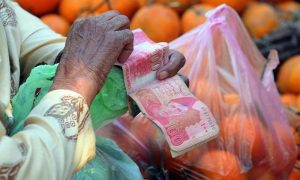As prices of essential goods continue to rise, the weekly inflation rate reaches 30.16%.
The price of food, particularly onions, tomatoes, and pulses, has been steadily climbing for the past six weeks in a row.

ISLAMABAD: The rate of inflation, which has been steadily increasing for the sixth week in a row, increased by 0.48% week-on-week, while the year-on-year inflation hit 30.16% for the week that ended on November 24. This was reported by the Pakistan Bureau of Statistics (PBS).
The majority of the increase can be attributed to an increase in the cost of key food items, such as onions, tomatoes, and lentils, which all saw price increases.
According to information that was made available on Friday by the Pakistan Bureau of Statistics (PBS).
According to the Sensitive Price Indicator (SPI), the prices of 19 products went up during the period under consideration, while the prices of nine items went down, and the prices of 23 items did not change.
The price of a dozen eggs has increased by Rs21.50, and the price of a kilogramme of chicken has climbed by Rs11.60.
According to the PBS, the cost of one kilogramme of sugar is now Rs1.20 more expensive, while the price of one kilogramme of onion has climbed by Rs4.48. In a similar fashion, the costs of potatoes, fresh milk, rice, garlic, and meat have all gone up in recent years.
The price of diesel experienced an increase of 64.57% while the price of gasoline experienced an increase of 54.71% when compared to the previous year.
The short-term inflation rate, as measured by the SPI, decreased to 0.62% week-on-week during the most recent week, which ended on November 17, after having increased to 0.74% the previous week. During this time, the PBC reported that the annual percentage increase in week-to-week inflation had reached a record high of 28.67%.
It is important to note that the inflationary trend in the country shattered a record that had stood for decades this year. This was caused by a sharp rise in the costs of international commodities as well as a loss in the value of the rupee.
In addition to this, the government’s decision to eliminate power price subsidies in accordance with an agreement reached with the International Monetary Fund (IMF) also contributed to an alarmingly high rate of inflation.
In a similar fashion, disastrous floods that occurred during the monsoon season completely obliterated standing crops, which resulted in a lack of vegetables. Due to the dramatic increase in the severity of the shortage, the government was forced to lift the tariffs placed on the import of tomatoes and onions from Afghanistan and Iran.










































